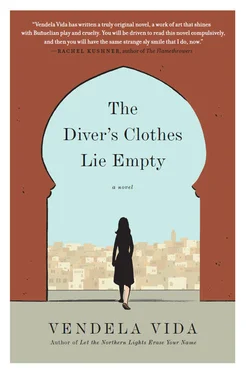You stare at his face, memorizing his features: caramel eyes, a straight nose. You know that you might need him.
“Yes, thank you very much,” you say. As you shake his hand to thank him for his offer, one of the crew members who is indeed sloppily dressed approaches the manager.
The man speaks in French to the manager and says there’s a problem. You can’t make out much else except for the word drapeau. Your brain picks out a definition you didn’t know you had: flag .
There seems to be an issue with the flag flying outside the Regency Hotel. You notice you’re lingering, so you walk away and approach the concierge desk, where an older gentleman in a crisp suit stares out at the lobby as though he’s standing at the helm of a boat, observing an unextraordinary view.
You ask the concierge for directions to the embassy and he unfolds a small map. He circles the hotel, and circles the embassy, and hands you the map. You’re relieved that the embassy appears close because you have no cash for a taxi. You will have to walk.
You step out of the hotel. No filming is currently happening. Men and women, dressed shabbily, are moving monitors around and adjusting wires while smoking dense, heavily packed cigarettes.
You walk in the direction of the embassy. The area surrounding the Regency is not much of a neighborhood; it’s a grid of wide streets where people sell goods, many of which appear to have been stolen. You search absentmindedly for signs of your computer, your camera, still in its box. But this street is for the selling of stolen items that no one wants. An elderly toothless woman sits on an upside-down crate and displays a used and cracked asthma inhaler. A young man sells mix cassette tapes, their labels handwritten, some with hearts.
You walk to an enormous square and find hundreds of people gathered around. You ask one of the many guards what’s going on. “Qu’est-ce qui se passe?” you say. But he doesn’t understand the question. You question your French. You know you said it correctly. So you ask again. Still, he looks at you as though you should know.
Red Moroccan flags are everywhere — flying from every flagpole in the square, jutting out from buildings, hanging from balconies. You stand behind the rows of men in black leather jackets — they are almost all men — and a few children, who wait with eight-by-ten photos. You catch sight of one of the photos: it looks like a younger version of the king. Of course. Le prince . The prince.
Everyone around you is waiting for the prince himself.
Now you see a row of dignitaries lined up and you realize they too are there for the prince. You decide to remain where you are for a minute to see if you get a glimpse of him, before you keep moving.
You begin to feel stares as you stand there, the only Westerner in sight who’s waiting for the prince. And the only woman. Where are the women? From your neck you remove your deep orange scarf, a scarf that you packed because it seemed Moroccan to you, or at least the shade of a Moroccan spice. You take it and wrap it around your head, covering much of your face. You dressed for the embassy, for the Regency but not for the street.
The scarf around your head cuts down on some of the stares, but still you are female. You wish you had an umbrella with you — it looks as though it might rain, and besides, an umbrella would allow you to hide. You decide to keep walking. It’s almost 4 P.M. and you assume the embassy closes at 5. You don’t have time to wait for the prince. You consult your map: the fastest route would be to walk across the square in front of you, but it’s now blocked off for the prince’s arrival, so you make your way around the large city block.
The neighborhood is in disrepair — benches are missing their seats, or tipped to the ground, the sidewalks are uneven. Grass is spotty and rare and no flowers have been planted. The people lingering in the streets where you walk are homeless or appear drunk. They don’t seem to be aware, or else it doesn’t mean anything to them, that nearby hundreds of people are awaiting their prince.
When you’re almost all the way around the block, it starts to rain — first lightly, and then thrashingly. You duck under the canopy of a storefront for cover. Two men in leather jackets sprint out of the rain and under the canopy as well. They light cigarettes. The prince has still not arrived. More people are gathering and the guards are beginning to prohibit pedestrians from crossing the street.
Barricades have been erected, indicating down which streets the prince and his cavalcade will drive. Throngs of people stand in front of the silver railings. When the rain stops, which it does as suddenly as it started, you try to continue on your way to the embassy, but there are roadblocks everywhere.
You cross one street and take a right, only to find a barricade that forces you to retreat and take a different route. You endure the stares of people taking note of your skin, your body. Even an elderly grandmother holding the hand of a young boy gives you a stare that says, You should not be here.
You squeeze between two barricades and a policeman whistles. You raise your hand apologetically and move on. You need to keep moving.
Finally you make it to the embassy. It’s 4:40. You’re still wet from the rain. You should have brought an umbrella. A psychiatrist friend of yours once told you that a telltale sign of a mentally unstable person is she’s never dressed appropriately for the weather. You decide to wait outside under the awning for another couple minutes to allow yourself to dry off even a little.
When you enter the embassy, you’ve never felt so happy to see the American flag. You pass through the metal detector, and you’re given a number. You sit in a folding chair waiting, surrounded by families and couples. You are the only one there by yourself. The room is small but regal, with flags and portraits. You stare at the photograph of Obama on the wall. He seems to care about you. Or is his look one of mild disappointment?
When your number is called, you approach window number three. An American woman in her forties, with a Sontag-gray streak in her dark hair, greets you. “How can I help you?” she says.
You find her formidable, and probably attribute more intelligence to her because of her Sontag streak, her streak of Susan Sontag.
“I’m an American citizen,” you say. “I live in Florida. Usually. My passport and computer and everything were stolen by someone wearing a badge when I was checking into my hotel. The Golden Tulip.”
“They were wearing a badge?” she says.
“Yes, but that was just a front.”
“Have you been to the police?”
“Yes,” you say. “They gave me another backpack that wasn’t mine to replace my backpack. I mean, they thought they were giving me the right backpack. Or maybe they didn’t think that. Anyway, I got the wrong backpack back. So now I have someone else’s backpack and passport.”
“Why would the police give you someone else’s backpack?”
“I don’t know,” you say. “Maybe they were in on it.”
“In on it with whom?”
“With the hotel.”
“You’re saying the Casablanca police and the Golden Tulip were in cahoots to steal your backpack.”
It sounds ludicrous coming from her mouth.
“Yes,” you say, suddenly less certain of anything, of everything.
“Can I see your ID?” she says.
“That’s the thing: I don’t have any ID. I just have this other backpack and passport, which I left at the hotel for safekeeping.”
“But why would you have someone else’s backpack and passport?”
“Because the police gave it to me.”
“Can I see the police report?” she says. “With your name on it.”
Читать дальше












